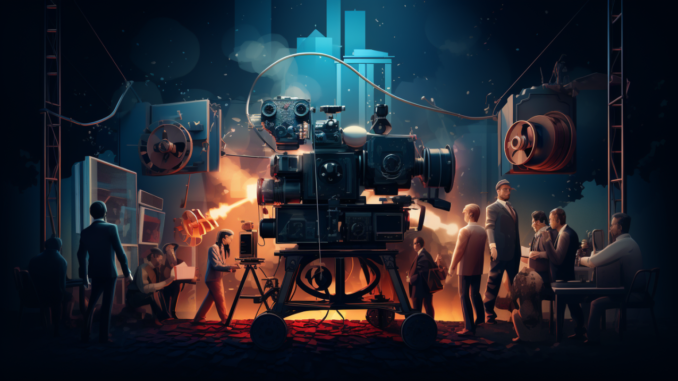

The film industry is undergoing a transformation, with artificial intelligence (AI) playing a crucial role in shaping its future. AI is no longer just a tool for behind-the-scenes work; it’s becoming an essential part of the entire movie production process. From scriptwriting to post-production, AI is enhancing creativity, streamlining processes, and pushing the boundaries of what filmmakers can achieve. Let’s explore how AI is changing the way films are made.
AI in Pre-Production: Revolutionizing Scriptwriting and Planning
In the early stages of movie production, AI is already making an impact. One of the most significant contributions is in scriptwriting. AI tools can now analyze thousands of successful scripts to generate storylines, plot ideas, and dialogue. These tools are helping screenwriters by suggesting plot twists, character arcs, and even unique lines of dialogue.
AI-Assisted Story Development
AI software can scan extensive databases of films and books to identify trends and audience preferences. By doing so, it can help predict what kinds of stories will resonate with viewers. This data-driven approach aids filmmakers in tailoring scripts to current audience interests, making films more likely to succeed.
Budgeting and Scheduling with AI
AI also assists in the logistics of movie production. It can analyze past films and estimate costs and timelines for various aspects of production, such as casting, location scouting, and special effects. This information helps producers plan their projects more efficiently, saving both time and money.
AI in Filmmaking: Enhancing Creativity and Visual Effects
Artificial intelligence is not only assisting with writing and planning but also directly influencing the creative aspects of filmmaking. The use of AI in visual effects (VFX) and animation has been groundbreaking, allowing filmmakers to create stunning, realistic scenes that were previously unimaginable.
Realistic CGI and Visual Effects
AI has become an indispensable tool in the creation of CGI (computer-generated imagery). With AI-powered software, artists can generate lifelike visuals and special effects faster and more accurately. AI can predict how objects move, how light interacts with surfaces, and how textures will appear on screen, making the VFX process smoother and more realistic.
AI-Driven Animation
AI is also transforming the world of animation. By learning from vast libraries of animated films and characters, AI can create more fluid, natural animations. AI-powered tools can even generate facial expressions and body movements that align with specific emotions, allowing animators to focus more on creativity than on repetitive tasks.
AI in Post-Production: Editing and Distribution
The role of AI in movie production extends beyond filming and visual effects into the realm of post-production. AI-driven software is now helping editors assemble footage, adjust sound, and even recommend cuts that will make the film more engaging.
Smart Editing Tools
AI tools analyze raw footage and identify the best takes, making the editing process faster and more efficient. For example, AI can automatically select scenes based on factors like pacing, emotion, and visual composition. These tools not only save time but also help editors create more polished and dynamic films.
AI in Sound and Music
Artificial intelligence is also being used to compose music for movies. AI systems can generate original soundtracks tailored to the mood and tone of a film. These AI-generated scores can either complement traditional compositions or be used independently in smaller-budget projects.
Optimizing Distribution with AI
AI is also making waves in the distribution process. Streaming platforms like Netflix and Amazon Prime use AI algorithms to recommend films based on viewers’ preferences. This personalized approach helps filmmakers reach their target audience and ensures that films get the attention they deserve.
The Future of AI in Filmmaking: What’s Next?
The integration of AI in movie production is still in its early stages, and the possibilities for the future are endless. As technology continues to advance, we can expect even more breakthroughs in filmmaking. One exciting development is the use of AI to create fully realistic digital actors, which could revolutionize the way movies are made and cast.
AI-Generated Actors and Digital Performances
In the near future, AI may be used to generate digital versions of actors, allowing filmmakers to create characters that are entirely computer-generated. This could reduce the need for expensive physical sets or actors’ schedules and allow for more flexibility in storytelling. AI-generated actors could also enable performances from actors who are no longer with us, opening up new creative avenues for filmmakers.
Improved Audience Engagement
AI will also continue to enhance audience engagement by providing more immersive experiences, such as interactive movies and personalized storylines. This could blur the lines between film and video games, offering a completely new form of entertainment.
Conclusion: A New Era for Movie Production
AI is undeniably transforming the movie industry, from pre-production to post-production. As filmmakers embrace these new technologies, they can create more innovative, visually stunning, and engaging films than ever before. The future of filmmaking is bright, and AI will continue to play an essential role in shaping that future. With the rapid advancement of AI, the possibilities for creativity and storytelling in the film industry are limitless.
As this technology evolves, it will only become more integrated into the production process, potentially changing the way movies are made and consumed for years to come.
Stay Updated on the Future of Film
As the film industry adapts to the rise of AI, stay tuned for the latest developments in technology and entertainment. The marriage of creativity and technology is setting the stage for a new era of filmmaking.

Leave a Reply